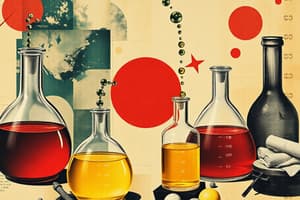Podcast
Questions and Answers
What is the term for a reaction in which heat is given out along with the products?
What is the term for a reaction in which heat is given out along with the products?
- Endothermic reaction
- Decomposition reaction
- Exothermic reaction (correct)
- Combination reaction
What type of reaction occurs when an element displaces another element from its compound?
What type of reaction occurs when an element displaces another element from its compound?
- Displacement reaction (correct)
- Double displacement reaction
- Combination reaction
- Decomposition reaction
What is the process in which a single substance breaks down into two or more substances?
What is the process in which a single substance breaks down into two or more substances?
- Decomposition reaction (correct)
- Double displacement reaction
- Displacement reaction
- Combination reaction
What occurs when two different atoms or groups of atoms (ions) are exchanged?
What occurs when two different atoms or groups of atoms (ions) are exchanged?
What is the term for a reaction in which energy is absorbed?
What is the term for a reaction in which energy is absorbed?
What is the process in which two or more substances combine to form a new substance?
What is the process in which two or more substances combine to form a new substance?
What type of reaction produces insoluble salts?
What type of reaction produces insoluble salts?
What is the definition of oxidation?
What is the definition of oxidation?
What is the definition of reduction?
What is the definition of reduction?
What is necessary for a chemical equation to be valid?
What is necessary for a chemical equation to be valid?
Flashcards are hidden until you start studying
Study Notes
Chemical Reactions
- Chemical reactions occur due to the reaction between substances, such as magnesium and oxygen in the air.
- A chemical reaction can be determined by observing changes in state, color, evolution of gas, or change in temperature.
Chemical Equations
- Chemical equations represent reactants, products, and their physical states symbolically.
- Equations must be balanced to ensure the same number of atoms of each type on both reactant and product sides.
- Physical states are represented by notations (g), (l), (aq), and (s) for gaseous, liquid, aqueous, and solid states, respectively.
- The word "aqueous" is written if the reactant or product is present as a solution in water.
Types of Chemical Reactions
- Combination reactions: two or more substances combine to form a new single substance.
- Decomposition reactions: a single substance decomposes to give two or more substances.
- Exothermic reactions: reactions in which heat is given out along with the products.
- Endothermic reactions: reactions in which energy is absorbed.
- Displacement reactions: an element displaces another element from its compound.
- Double displacement reactions: two different atoms or groups of atoms (ions) are exchanged.
- Precipitation reactions: reactions that produce insoluble salts.
Oxidation and Reduction
- Oxidation: the gain of oxygen or loss of hydrogen by substances.
- Reduction: the loss of oxygen or gain of hydrogen by substances.
- Examples of oxidation and reduction reactions include the reaction of copper and oxygen, and the reaction of copper oxide and hydrogen.
Studying That Suits You
Use AI to generate personalized quizzes and flashcards to suit your learning preferences.




